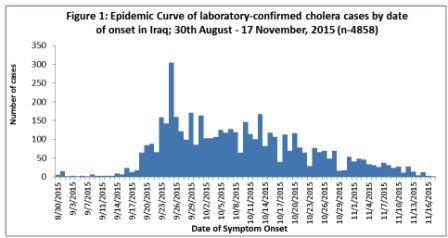22 November 2015 – The cholera outbreak in Iraq has continued to decline over the past 3 weeks with a few cases being reported from the affected districts or governorates. A total of 4858 laboratory-confirmed cases tested at provincial laboratories have been reported from the country, with 2 related deaths as of 17 November 2015.
Currently, 17 out of the 19 governorates in Iraq have reported laboratory-confirmed cases. The central public health laboratory has identified that the causative strain of this outbreak is Vibrio cholerae 01 Inaba. The strain has been found to be sensitive to commonly-used antibiotics, including tetracycline, ciprofloxacin and erythromycin. A total of 16 vibrio cholera isolates have been sent to the Pasteur Institute in France for genotyping and other advanced testing.
Since the first laboratory-confirmed case of cholera in Iraq was notified officially to WHO on 15 September 2015 in Alshamiya district in Diwaniya governorate, the Ministry of Health has collected 119 983 stool samples for suspected cholera. The positive stool samples were re-tested at the central public health laboratory in Baghdad for quality purposes and only 2745 stools samples were found to be positive for Vibrio cholerae 01 Inaba.
Nearly 10 districts within Baghdad, Babylon, Diwaniya and Muthana governorates have reported over 89% of all laboratory-confirmed cholera cases, and most of these districts receive their water supply solely from the Euphrates river. Figure 1 shows the declining trends in the number of laboratory-confirmed cholera cases reported daily in Iraq between 30 August and 17 November 2015.

The trends in cholera cases in the 4 most affected governorates and 5 most affected districts have been declining significantly in recent weeks. Likewise, district and governorate’s specific attack rates have clearly shown a downward trend in the last few weeks.
Considering the available surveillance data, there is no evidence that cholera is spreading to new communities or districts. According to the Ministry of Health none of the internally displaced persons and refugee camps across Iraq reported any laboratory-confirmed cholera case.
Response interventions
The Ministry of Health together with WHO, UNICEF and other stakeholders (health and WASH cluster partners) are continuing to step up implementation of comprehensive and multisectoral cholera response interventions to contain the current situation and prevent the further spread of cholera. As part of the public health interventions to contain the spread and interrupt transmission, the first round of the mass vaccination campaign using oral cholera vaccine (OCV) has been completed in 62 high-risk IDP and refugee camps achieving vaccination coverage of over 93% among the target population. Other ongoing response activities include the following:
- holding regular coordination meetings under the umbrella and guidance of the National Task Force in Baghdad;
- organizing joint health and WASH cluster meetings in Baghdad on a weekly basis;
- enhancing disease surveillance and laboratory support across all affected governorates;
- ensuring use of rapid diagnostic test kits for rapid diagnosis and screening of clusters of suspected cholera cases;
- ensuring the availability of safe drinking-water, sanitation and food in affected districts;
- providing extensive chlorine monitoring and water testing at household and community levels to ensure adequate chlorine residual;
- intensifying the public awareness raising campaign through all available communication channels;
- ensuring the availability of adequate and essential medical and non-medical supplies;
- deploying international experts to provide technical support to Iraqi health authorities in the areas of risk assessment, surveillance, case management, laboratory support, OCV campaign and WASH.



